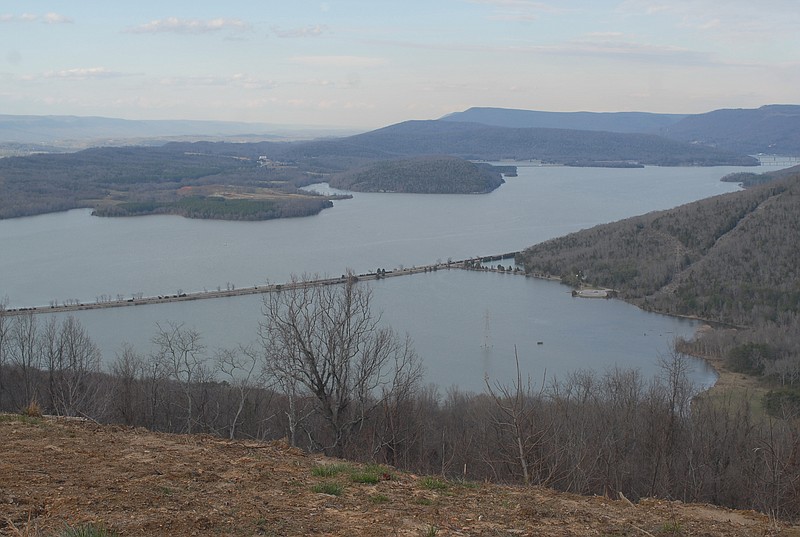Here we go again. Georgia is whining anew that Tennessee's southern border is drawn wrong, and Peach Staters are angling to bully a straw into the Tennessee River near Nickajack Cave.
Georgia legislators are renewing a call to reclaim a narrow strip on the state line to quench the thirst of long-out-of-control water waste in metro Atlanta, which currently is served only by Lake Lanier which feeds the Chattahoochee River. In at least eight of the last nine years, Lake Lanier has been at full pool in the summer less than 14% of the time while Atlanta consumes half again as much water per person per day as Chattanooga.
In the Chattanooga/Nickajack area, the state line has been mapped incorrectly quite literally almost since early American mapping began. It was 1818 when surveyors mistakenly set the border between the states about 1 mile south of the 35th parallel - where Congress said it should be when Tennessee became a state in 1796.
But in recent decades - as populations increased and Georgia's other natural waterways got sucked off to feed industries and megafarms in the Peach State, Alabama and Florida, our neighboring lawmakers have pretty much made a yearly renewed noise about righting the 200-year-old mistake.
Each year, one or another member of the Georgia General Assembly approves a resolution to form a delegation to negotiate the "true border" with Tennessee. If diplomacy fails, those resolutions declare, Georgia could take its case to the U.S. Supreme Court. At times, the lawmakers have said they don't want to annex the entire 51-mile stretch of misplaced land - about 30,000 residents in a southern strip of Chattanooga. All they really want is that little cove on Nickajack Lake fed by the Tennessee River where they can run a pipe to siphon off millions of gallons of water a day.
That sounds simple enough. The Tennessee River is said to have 1 billion gallons per day of "excess" capacity. Here's the catch: metro Atlanta's 15-county water district already consumes half that much. What happens when dozens of cities and scores of industries already tied to the mighty Tennessee here and downstream in Alabama, Tennessee and Kentucky also grow? Cities like Jasper, South Pittsburg, Bridgeport, Scottsboro, Guntersville, Huntsville, Decatur, Muscle Shoals, New Johnsonville, Paducah? What happens as industries like Red Stone Arsenal expand? What happens when some big industry understands how to make a go of the stalled Bellefonte facility in Jackson County and a new town springs up around it?
There's still plenty of water for everyone, you think? Well, thinking like that is what made the Colorado River dry up rather than emptying into what was once a rich 6 million-year-old estuary at the Gulf of California in northwestern Mexico. Instead, beginning in the 1920s, Western states began divvying up the Colorado's water, building dams and diverting the flow hundreds of miles, to Los Angeles, San Diego, Phoenix and other cities. Now 70 percent or more of the Colorado's water is siphoned off to city growth and 3.5 million acres of cropland. Yes, it was and is a triumph of engineering, but there are severe trade-offs. The river has been running especially low for the past decade, thanks to increasing drought. In the Grand Canyon and in Arizona's Lake Mead, lines "distinct as bathtub rings," show the water level 130 feet lower than it was even in 2000, according to Smithsonian Magazine. Water resource officials say some of the reservoirs fed by the river will never be full again, and climate change likely will decrease the Colorado's flow still more by 5 to 20% in the next 40 years.
We would be foolish to think there will be no climate change affect on the Tennessee River.
Last December, then-Tennessee Gov. Bill Haslam released a statewide water plan. Though Tennessee has long been one of the few states without a long-range water strategy - partly because we were one of the few without already serious shortages - Haslam thought we should be proactive.
"Tennessee is blessed with great resources of water today, but we should never take that for granted," he said in announcing the plan, dubbed TN H2O. "As our state grows, we must maintain our capacity to meet our water needs. That takes a plan."
It's too bad Georgia didn't do the same thing decades before the first developers of Atlanta began expanding one of the few cities on the continent that wasn't on a durable river or major water source for reasonable growth. Now Atlanta continues to grow, but not in any sustainable way.
A half decade ago, Chattanoogans on average used 95 gallons of water per person per day, according to Tennessee American Water Co. In Atlanta, that per-person number was 151 gallons a day, according to Georgia's Environmental Protection Department. And that was despite summer watering bans and public appeals for conservation.
The great pity of all this is that we - all of us in any state and on any waterway - haven't quite figured out how to save the billions of gallons of flood waters that simply flow away - through and out of our reservoirs when heavy rains blanket the Southeast seasonally. We need second cups for storage when our first cups runneth over.
Rather than spend millions in taxpayer money to fund more state study groups and lawsuits, the lawmakers of Georgia and Tennessee should be looking to fund new catchment reservoirs and leaky water infrastructure improvements. (Haslam's water plan notes that Tennessee water utilities need $15.6 billion for repairs and upgrades.)
With growing populations and a changing climate, water will be the new gold.
